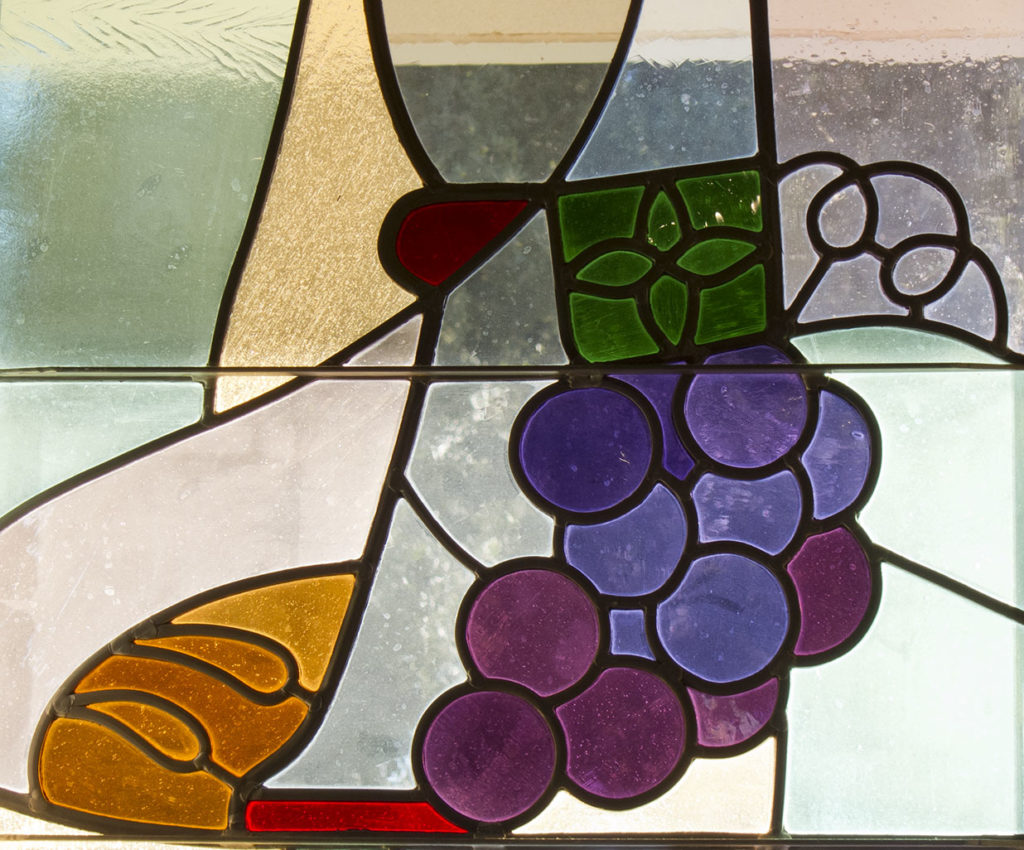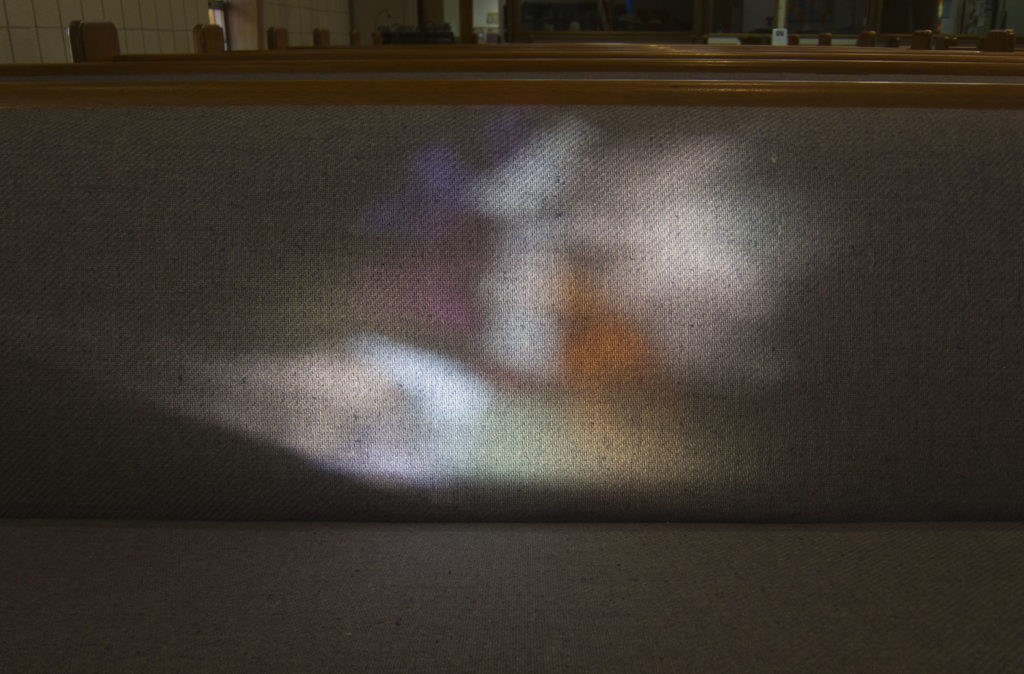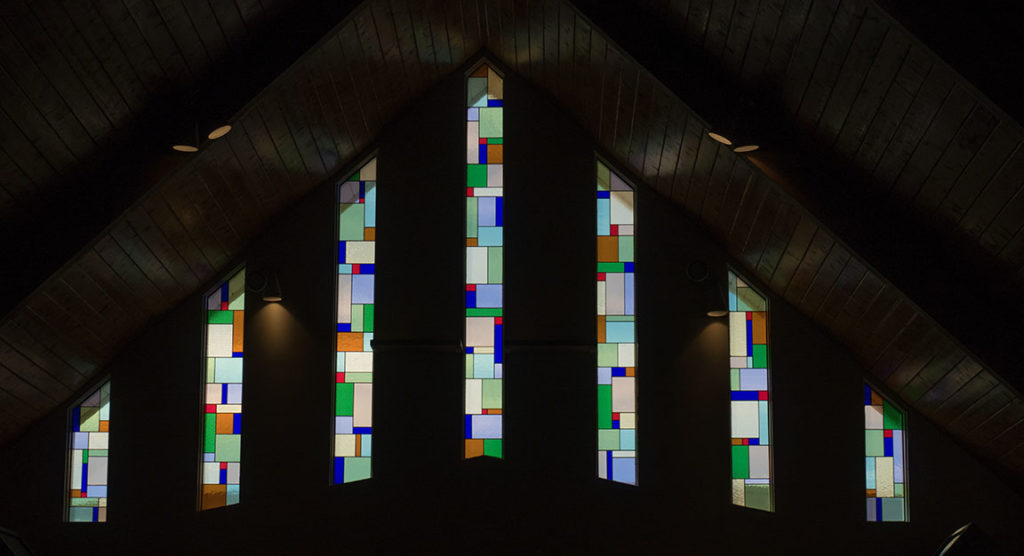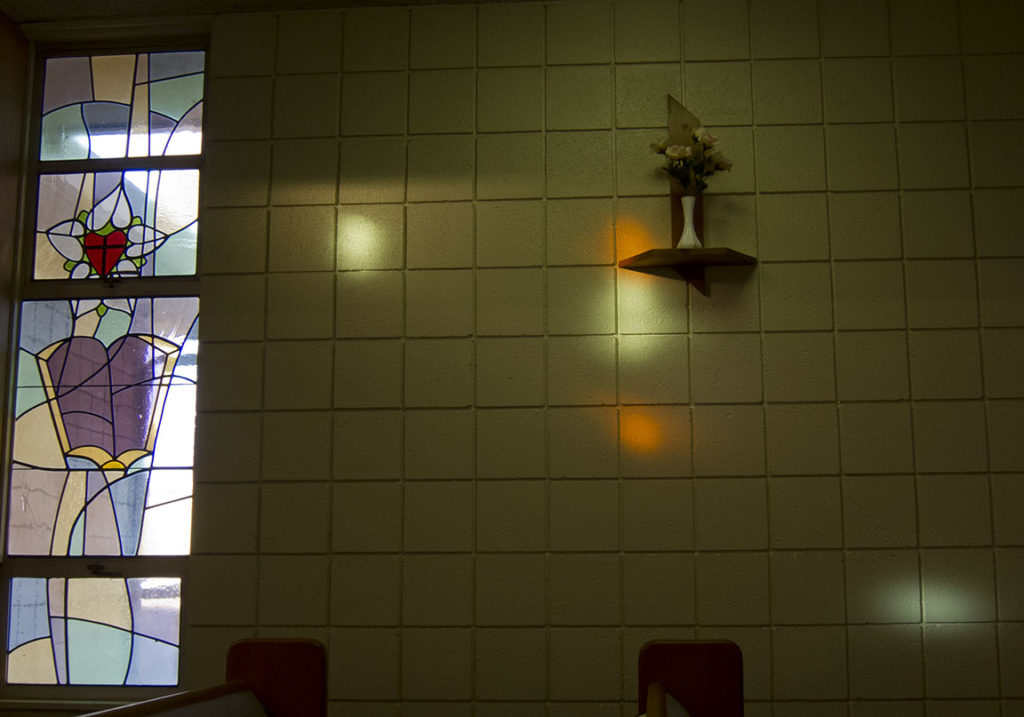Rev’d Eric V. Kaelberer, Grace Lutheran Church, Rialto, California
✝ sdg ✝
Beloved Saints of the Good Shepherd,
As the hymn for Transfiguration says it so well, ‘Tis good, Lord, to be here! I am truly grateful to be with you this morning as your dear Pastor is in the blessed city of Fort Wayne, serving you and the larger church as he serves and learns. And, just like Peter, James, and John atop the Mt. of Transfiguration, in today’s Word we will hear the voice of God and at His Table we will receive nothing less than He Himself in His true Body and Blood for our forgiveness and renewal. Yes, ‘Tis good, Lord, to be here!

Stained glass…
Today is the 2nd Sunday after the Epiphany. Now Epiphany is that celebration of how we know that our God is for all nations, all people, even you and me, that the Light of Christ shines through… through the darkness of death and sin and the grave… through to life and light and peace!

… projected onto the pew.
Not long ago one of my members asked me why God would bother with her. She felt her unworthiness very deeply. Joyfully I reassured her that seeing the love of God in the Infant of Bethlehem meant that our unworthiness is answered by this God who has loved us from before the foundations were laid for the Universe! I reassured her that it is His love and His heart that matter, His gift of Christ in our flesh, Christ on the Cross, Christ, Risen and Ascended, Christ reigning and surely returning… all for poor miserable sinners like her, like me, and yes, dear members of Good Shepherd, the Good Shepherd, He loves poor miserable sinners like you. His call is what matters. It is the effective call of Grace!
This Sunday we have the calling of the first disciples, we also have the calling of Samuel as Judge over Israel. And, by extension, we have the calling of each one of us here this morning – that is what our Baptism means – It is the application of what the Holy Spirit brings for surely we are called, we are gathered together as His family. We are enlightened by His Law and His Gospel. Yes, and as His own, we are sanctified, made continually holy as we are continually living in repentance and His forgiveness as we are fed at His table with His true body and blood!
Are you worthy? Was Philip? You know that his name is Greek, not Hebrew! His name means “one who loves horses!” He was from Bethsaida, a town that is at about 1 o’clock, on the North-East shore of the Sea of Galilee. This was not the center of Jewish life at all. Indeed, five of the 12 are from this remote Northern Galilee town – Andrew, John, Simon, James, and Philip! Nathanael or Bartholomew is from Cana, also in Galilee of the Gentiles. If you want to see someone who did not fit the mold of someone who had the correct pedigree, it would have to be Mr. Horse-Lover! Andrew, Simon Peter’s brother has a Greek name as well. Andrew means “manly.” Simon Peter is yet another of these who while very devout, well, they lacked the right “bona fides” of the “in crowd.” But these men, these Jews in this remote place heard the Word in Synagogue and in the home, and also from the witness of the last of the OT prophets, our dear John the Baptizer!
So here we have this crew of seeming “misfits” who have followed the man who wore camel’s hair and ate locusts and wild honey – the one whose voice was crying in the wilderness – Prepare the way of the Lord! Now we can add another wrinkle to this scene. John, the Beloved Disciple, he sees Jesus as The One who has come in his flesh to save him, and yes, all! Jesus is here, right here. He doesn’t hover above the earth like a ghost or apparition. John answers the Docetic heresy well. Human and Divine in the one person of Jesus.
That is what makes John’s words in this Gospel so telling. Philip identifies Jesus as being one of them, from their region, this forgotten spot called Galilee of the Gentiles. And Jesus does not correct Philip. Jesus could have said, “Oh, No! Not Nazareth but Bethlehem… remember shepherds, angels, My mom pondering these things… haven’t you read Luke 2!” But instead, hear again how Philip introduces Jesus as Messiah to Nathanael: “We have found him of whom Moses in the Law and also the prophets wrote, Jesus of Nazareth, the son of Joseph.” (V. 45)
This is Jesus of Nazareth! He is a local boy who happens to be the One written of, spoken of, borne by Prophets and Poets of old, of Moses and all. He is God and He is a local boy. Behold, we know this Jesus as the son of Joseph! God for all is God in our flesh. God as payment for the sins of the world is God in our flesh! Epiphany is all about the revelation of God to man, of the Eternal and Perfect One who is Redeemer, to poor miserable sinners like these Galilean fishermen and their friends! He is the Son of God… oh, and the son of Joseph! In other words… He is the full redeemer of the world! We read over this introduction to Nathanael too quickly. Jesus is presented as God truly with us, with them, in their flesh, yes, even in their dialect and dress! The Almighty Redeemer of the World is knowable to us.
Thus, with this introduction the question of Nathanael makes sense: Nazareth? Can anything truly excellent and praiseworthy (the word is agathos in the Greek) come from Nazareth? It is a great question, not unlike my parishioner’s question of her worthiness. He was asking if God come from “our neighborhood” was for real! While there may have been some skepticism – we don’t want to paint Bartholomew/Nathanael as a white porcelain saint – Nathanael had learned from John the Baptist, as John the disciple recorded earlier, Behold, the Lamb of God, who takes away the sin of the world! (V. 29, 36). Nathanael wants to be sure. He is an honorable man. To know that the Savior of the World is that accessible, that much in our flesh as well as that much “God of God, light of light, very God of very God, begotten, not made, being of one substance with the Father, by whom all things were made…”
Well, can anything truly excellent and praiseworthy come from Nazareth, Philip? Philip’s answer is the same as that given by Jesus Himself when He first called Andrew and Simon Peter the day before when they asked, “where are you staying?” The answer is simple: Come! And See!
Nathanael does come and does see. Here is the Lamb of God who takes away the sin of the world. But it is Jesus who sees him first and who speaks first. Jesus comes to Nathanael and declares, Behold, an Israelite in whom there is no deceit! Nathanael’s question of anything good coming from Nazareth is so wonderful, for it is honest. Nathanael isn’t trying to join in the latest Ponzi scheme – he wants the Good Shepherd, he wants the Lamb of God who takes away the sin of the world! Jesus acknowledges the very heart of truth that He Himself gave to Nathanael!
Jesus gave Nathanael the heart to believe, and He does the same for you too, beloved. To Nathanael he declares that He knows who Nathanael is, that He knew him before he even Philip called him while sitting beneath the fig tree. Jesus is omniscient, He is all knowing! And soon, when the earthly ministry is completed at Golgotha, the place of the skull, Nathanael will see this omniscience married to our Jesus’ perfect love in service to humanity as He dies in Nathanael’s place, and in your place and mine!
Nathanael will say something that is honest, that is without guile or deceit, “Rabbi, You are the Son of God! You are the King of Israel!” (V. 49) It is true, and like young love, without full understanding. Jesus declares to this guile-less guy, our brother, Nathanael: Because I said to you, ‘I saw you under the fig tree,’ do you believe? You will see greater things than these. And He said to him, Truly, truly, I say to you, you will see heaven opened, and the angels of God ascending and descending on the Son of Man.
Why has Jesus come? If it is to fortune tell, to put on a good show, then we ought to leave this place and stop wasting our time. Ah, but He has come for something so true, so noble, so honorable, and so unattainable by us or by any other way. He is come for the greater thing, the greatest thing of all, Christ as our access to the Father in heaven.
Jesus is perhaps thinking of Genesis 28, Jacob’s dream at Bethel, the story of Jacob’s Ladder. In that dream Jacob was told that his descendants would be like the dust of the earth and from the four corners of the earth, and in Jacob’s seed, our Savior Jesus, all the descendants of the earth shall be blessed (Genesis 28:14). Yes, it is a perfect echo of Genesis 12:1-3!

windows at back…
Yes, this perfect God who is also in our flesh, this God who knows all things and who effectively calls, gathers, enlightens, sanctifies and keeps His Bride, His Church… this God is the Savior of all nations, of all peoples – His light shines to every tribe and nation and people… even folks from Nazareth, from Cana, from Bethsaida… yes, even from Yucaipa and Mentone, from Highland and Beaumont!

… projected on the wall
Can anything true and holy and righteous come from Nazareth? Beloved, on this Table, in this His House, He bids you to come and see, to come and eat, without cost and without price, the finest of rich food! Come and see, beloved. Even so, Amen and Soli Deo Gloria!
In the Name of the Father and of the ✝ Son and of the Holy Spirit.